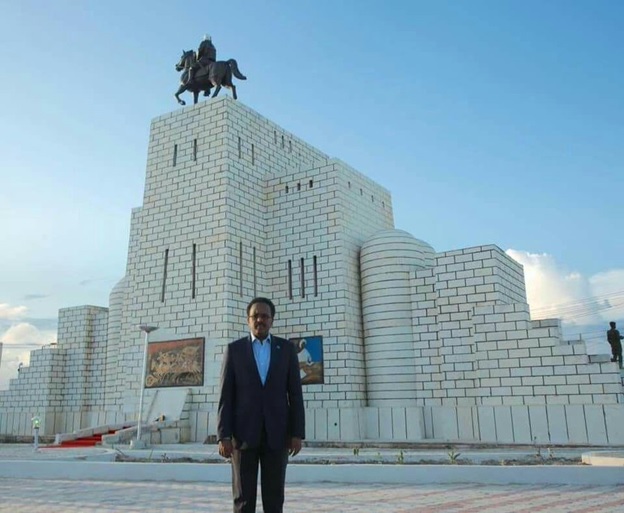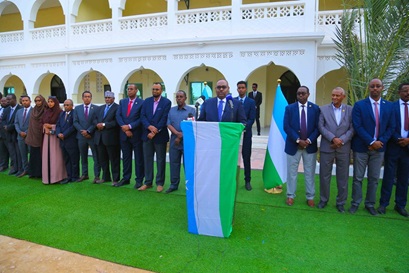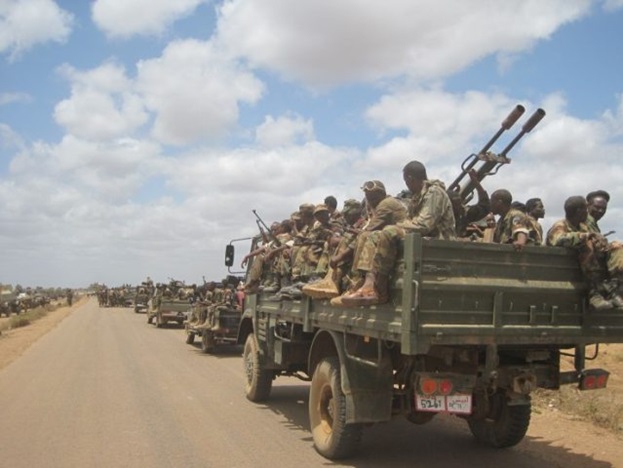By Faisal A. Roble
Basil Davidson, a British historian, and an Africanist, once wrote that England was a mere geographic expression when Mansa Musa of the Mali Empire was melting metal and gold (Basil Davidson, History of Africa). In the same token, at a time when neighboring African states are at their “take-off stage,” per the five developmental stages Walt Whitman Rostow formulated in the 1960s as a response to the Marxian stages of human development, Somalia is, as it exists today, at the stage of “traditional society” where the country is nothing but a geographic expression with three layers of mini-states: (1) Somaliland, (2) Puntland and Jubbaland, and (3) Hirshabelle, Southwest, and Galmudug. (Rostow identified five stages that societies pass through the first being “traditional society…). Until President Farmajo violently violated the unifying constitution, the regions were likened through a fledgling federal system. That unity is waning.

The three geographic layers mentioned above are at different stages in state formation, some a bit advanced while others are at an ebb in their progress for the last three years. Some of the states are clinging to a federal status guaranteed per the draft constitution whereas others are under the total eclipse of Villa Somalia with no say on state matters.
How each federal member state deals with Villa Somalia and with the outside world, therefore, is predicated on the level of their respective real or perceived federal member state formation.
Somaliland is a class by itself and can be arguably said to be the most advanced mini-state. It has a relatively higher level of international cooperation, participates at several world stages, and built an adequate army to even rebuff any threat coming from the Somali Federal Government (SFG). At a minimum, it has attained what Taiwan had for many years – a sort of statehood without tacit recognition by the United Nation.
However, most Western journalists treat Somaliland as if it is an independent country. Ethiopia and Djibouti do so, although under the cover of trade cooperation. In 2018, Somaliland sealed a major deal with DP and the government of Ethiopia to develop the Barbara Port and divide shares in three ways. Donor countries also recognize that Somaliland has secured peace, a modicum of state stability, and a heightened self or national confidence and cohesion that needn’t be disrupted.
The 2012-2016 Somali compact (a phantom document meant to guide Somalia’s nation-building), now a relic and discredited document collecting dust in a shelf inside Villa Somalia treated Somaliland as a separate entity from the rest of Somalia. It was inadvertently a de facto recognition of Somaliland by both Villa Somalia and the International Community. Somaliland’s 2030 plan was separate and was only added to the document as an appendix but not part of the goals and objectives for the rest of the country. In the eyes of Somalia observers, this was a major move towards respecting Somaliland’s political position vis-a-vis the rest. President Farmajo, therefore, must not disturb Somaliland, maintains the IC, or else his aid will suffer.
The second category is a loose association consisting of Puntland and Jubbaland. Located on the north and south edges of the country, the two federal members states share a commitment to fend off from Farmajo’s adventurism that seeks to roll back the advancement thus far made towards federalism.
Like Somaliland, Puntland has established a well-functioning state; its army is sizable and thus far kept Al-Qaida contingents away from its population centers. The region’s cities ( such as Galkayo, Garowe, Qardho, Galdogob, Bosaso and Badhan) are thriving and peaceful. Schools, bustling businesses and a blossoming public sector are making significant contributions to the lives of the residents of the region.
Like Somaliland, Puntland has succeeded to enter into several international agreements on fishery, airport and seaport developments including Bosaso and Gara’ad is also considering to issue licenses for oil and mineral exploitation to outside companies. Unlike Somaliland, Puntland still works towards the preservation of the unity of Somalia, but only within the framework of the draft federal constitution.
A press conference President Said Deni gave on February 7, 2020, following the week’s cabinet meeting, he warned President Farmajo’s of stopping his infantile disorder, war mongering in Jubbaland, and his adventurism in flirting with the idea of reversing the process of the federation and the imposition of a unitary system of governance that has already failed. Thirty years ago, to this date, Somalis overthrew a centralized autocratic regime and President Farmajo’s futile attempt will not succeed, he added.

Until recently, Puntland was treated by Villa Somalia as a strong pillar in keeping the federal system together. Most of the work thus far done towards federating Somalia was spearheaded by Puntland. The two most decisive legislation that laid the foundation for federalism (Garowe I & Garowe II) were largely sponsored by and signed in Puntland.
However, due to devious politicians from that region, including but not limited to some of Puntland’s top minsters at the federal level, the hard work is done towards federalism since the end of the Somalia civil war is largely compromised.
Puntland’s own intricate clan system that is highly politicized is an accomplice in Villa Somalia’s fractious and peevish politics. Individuals who have been rewarded with positions at the federal level (ministers and members of the parliament), after they go to Mogadishu, become potent political tools often exploited by whoever occupies Villa Somalia against its own region. Each politician from Puntland (be a parliamentarian, a minister, or even civil society leaders) is quick to utilize clan and sub-clan politics to service on behalf of Villa Somalia. Even religious clerks, mainly those in Bosaso, are not immune to clan manipulations.
One of the major problems President Said Deni is facing is not Villa Somalia being strong, but rather clan political peddlers, especially those ministers close to Villa Somalia, who are weaponizing sub-clan politics. These politicians are not accountable to the state of Puntland but to a bunch of chieftains who in the first place selected them. And that is where the problem lies. As President Deni implied, Somalia’s journey to reestablish a functioning government is impaired by the antiquated 4.5 clan power-sharing formula.
In unveiling the genius of Siad Barre’s autocratic rule, the late Ali Mazrui identified three potent tools that Barre effectively used to rule Somalia before he lost his grip 30 years ago. These three tools are Religion, Clan, and Socialist Ideology (Ali Mazrui, 1980). At least the first two tools are employed by Villa Somalia-bound politicians that hail from Puntland as well as elsewhere.
As to Jubbaland, it has never been easy for its leadership to have a respite to complete federal member state formation. Early in its infancy, it was at war with Hassan Sheikh’s administration. We recall Abdullahi Godah’s bravado and his provocative statements in 2014 and 2015 when he was interior minister. Currently, Mr. Godah’s is at loggerhead with Puntland over that region’s management of its educational sector. All this because Mr. Godah either does not read the constitution, or he is under orders to completely bypass three consecutive articles: Article 52 and 53 talk about areas of the nation’s businesses where the federal cooperates and negotiates with member states, respectively. Education is one area where the two collaborate, while foreign aid, and international negotiations and debt relief are areas where the federal state is required to involve federal member states.
Following a respite and a short-lived stability, thanks to the administration of Hassan Sheikh Mohamoud’s final awakening to endorse collaboration than confrontation, Jubbaland seemed to have emerged from an era of perpetual conflict and went on to thrive; Between 2014 and 2016, it enhanced its security and Kismayo emerged within a short period of time one of the safest cities in Somalia. Business started to come back, and the three sub-regions comprising Jubbaland state strengthened their internal unity; it remained so until President Farmajo came to office in 2017 with venom and political, some say, clan, vendetta against President Ahmed Madobe. As of writing this piece, Gedo has been submerged into an internecine conflict where about four soldiers died and scores are wounded.
The deterioration of the relationship between Jubbaland and Villa Somalia has been gathering momentum. No Jubbaland office holder is any longer safe in Mogadishu. The region’s Interior Minister was kidnapped while in Mogadishu for business; he succeeded to escape the first week of February of this year from one of the prisons in Mogadishu.
As if that was not enough, facts are now emerging that President Farmajo even tried to kidnap President Ahmed Madobe while he was on a business visit to Mogadishu. This is imprudent and unpresidential behavior. In a city where Al-Shabab soldiers freely roam around and even collect taxes from business owners, one wonders why the President of Somalia would decide to kidnap another regional President or even invade Gedo region that is miles away from the capital city. A preferable and more prudent way to use resources would have been to fight Al-Shabab either inside Mogadishu or in the rural areas where the terror group has been hankered down for almost 20 years.
The third group comprising Hirshabelle, Southwest, and Galmudug, is nothing but an extension of Villa Somalia. Leaders in this group have voluntarily given up their constitutional rights and legitimate roles that are guaranteed to states. They seem to be comfortable to exist under the shadow of Villa Somalia if their positions are protected by Farmajo. On the other, the opposition groups who have tried to give voice to the masses of these regions have also been violently silenced.
The trio region is weak in governance and seems to enjoy less credibility with the people they claim to represent but pride over the cozy relationship they enjoy with Villa Somalia.
Concluding Remarks
Puntland: Puntland must reassert itself even if it must emulate Somaliland by calling for a full autonomy short of secession and continue the course until Villa Somalia comes to the table for a serious deliberation around the draft constitution. The press conference given by Said Deni on February and the subsequent press release on this matter is a timely and necessary step to slow down the pace at which President Farmajo wants to assert a unitary system of government in Somalia.
One of the successful attributes of why the leaders of Somaliland seem strong is that they rely more on the support of their people and most of the time ignore donor sentiments when it comes to state formation and politics. And that is the right way to govern your people. Puntland can learn such a lesson from its neighbor that remains to be seen. While reasserting its role as the lead in the federation process of Somalia, Puntland leaders need to pay attention to the agents of Villa Somalia whom it invited to an inclusive consultation conference to be held towards the end of March 2020
Jubbaland: Jubbaland has until now shown a meek face in a time of adversity. One serious problem with Jubbaland is its over-consciousness of what the donor community (USA and EU missions) would say if Ahmed Madobe asserts himself. Such psychology led to the erosion of Ahmed Madobe’s confidence in his people and in the cause for which he says he stands.

Guaranteed Jubbaland is complex and the clan relationship is more precarious here. Mr. Madobe has shown caution, gave room reconciliation and bilateral talks with President Farmajo, and attempted to avert any scenario that may lead to open conflict. But Mr. Farmajo refused to reciprocate. As such, President Ahmed Madobe can’t watch things deteriorate and always give in to what the donor community says while Farmajo amasses troops in Gedo. The ambush which took place in
Belet-Hawo in the wee hours of February 8, 2020, a day that was matched with the date of coronation of President Farmajao three years ago says all about Farmajo resolve for war and conflict.
The trinity of the “willing coalition” under the domination of Villa Somalia does not need any recommendation. President Ware of Hirshabelle was the first of the pack to fall victim of Villa Somalia. In turn, Farmajo successfully tamed him. In October 2017, he was a focal advocate for federal member states’ rights and roles. He emerged as the spokesperson for the states following a conference in Kismayo.
Upon his return, though, Farmajo so severely punished him by stopping about $400,000 promised for institutional building. I was with him at Halane Camp in Mogadishu, when President Ware received a scornful call from the Deputy Minister for Finance and told him that “he was not getting the money.” Mr. Ware almost fainted then abruptly left the meeting. From that day one, he became an obedient soldier of Farmajo’s. The other two have followed suit.
The opposition groups from Galmudug put up a good fight to have a free and fair election. Unfortunately, they have been outgunned. Despite all the money spent to buy votes for President Ahmed Abdi Kariye (Qor Qor), still President Ahmed Duale Gelle (Xaaf) and Sheikh Shakir did not concede and refused to recognize Villa Somalia’s man in the office.
If President Farmajo continues to ignore the rules and regulations stipulated in the draft constitution, relations between Villa Somalia and some of the regions would deteriorate and relations would be irreparable. Then the question is whether federal member states would take the hard stance that Somaliland has assumed for the last thirty years? If not, can they only learn lessons of tenacity and resolve confidence, and having clear goals and objectives, as well as relying on more on the wisdom of their people as opposed to IC officers in Nairobi and Addis Ababa.
Faisal A. Roble
Email: [email protected]
———–
Faisal Roble, a writer, political analyst and a former Editor-in-Chief of WardheerNews, is mainly interested in the Horn of Africa region. He is currently the Principal Planner for the City of Los Angeles in charge of Master Planning, Economic Development and Project Implementation Division
We welcome the submission of all articles for possible publication on WardheerNews.com. WardheerNews will only consider articles sent exclusively. Please email your article today . Opinions expressed in this article are those of the author and do not necessarily reflect the views of WardheerNews.
WardheerNew’s tolerance platform is engaging with diversity of opinion, political ideology and self-expression. Tolerance is a necessary ingredient for creativity and civility.Tolerance fuels tenacity and audacity.
WardheerNews waxay tixgelin gaara siinaysaa maqaaladaha sida gaarka ah loogu soo diro ee aan lagu daabicin goobo kale. Maqaalkani wuxuu ka turjumayaa aragtida Qoraaga loomana fasiran karo tan WardheerNews.
Copyright © 2024 WardheerNews, All rights reserved


